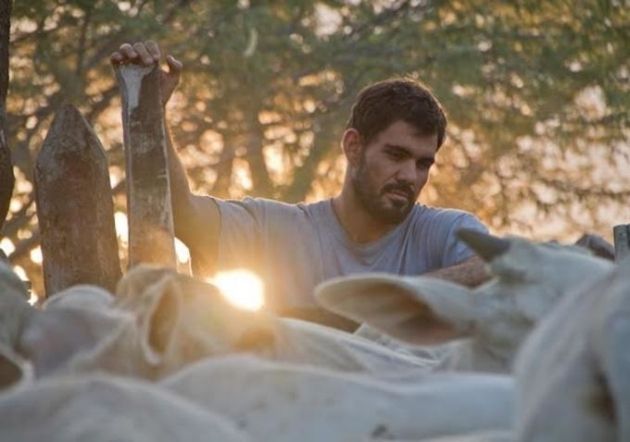
It wouldn’t be too much of a stretch to say that now, the pulse of the contemporary cinema could be found in Latin America. With relative political and economic stability (I use the term loosely here) after the economic crisis in the early 2000s, Argentina, Chile, Uruguay and Brazil have been producing some of the most exciting new talents in recent years.
In the case of Brazilian cinema, after the initial success of the favela movies in the international market- such as Central Station, City of God and Elite Squad which still owed themselves heavily to the tradition of Cinema Novo, a new generation of filmmakers emerged, severing the ties with the past and cultivating a different kind of art house cinema with the support of government’s cultural agencies. If this morning’s news of inclusion of Kleber Mendonça Filho’s new film Aquarius in competition at Cannes Film Festival this year, I’d say the future of Brazilian cinema is only getting brighter.
Brazilian filmmaker/visual artist Gabriel Mascaro is one of the happy recipients of such support from a pro-culture government. Mascaro’s hometown, Recifé, in the northeastern region of Pernambuco became a hub for burgeoning independent filmmakers as a result of government allotting money, finally, not only to the more developed, and commerce oriented southern region – Rio de Janeiro and Sao Paolo but also elsewhere in the country.
Mascaro, with his documentary background, demonstrates his anthropologist tendencies and lends sharp insights into often invisible cultural, societal, sexual boundaries of rapidly changing Brazilian society.
His latest, Neon Bull, is his second narrative feature after critically acclaimed narrative debut, August Winds. The film defies easy categorization as with the former. Exquisitely lensed by Diego Garcia (Cemetery of Splendor), Neon Bull transports us to yet another marginal segment in Brazilian society in Panambuco, northeast region of Brazil. The title comes from Brazilian rodeo (vaquejada)- it involves two cowboys on their horses sandwiching the bull from both sides and taking it down by yanking their tails. Sometimes the show goes on at night and they put iridescent paint over the bulls, hence Boi Neon (Neon Bull). The film follows one such traveling vaquejada trope.
The narrative pull is a little more consistent here than in August Winds. But as in his other films, the director's interest is elsewhere. While keeping a distance, the director zeroes in on a specific societal spectrum, stripping it down to a base level.
The slight, episodic narrative tells a story of Iremar (Juliano Cazarré), a hunky vaqueiro (cowboy) and his immediate surroundings. Iremar works for a vaquejada, which makes him to lead a nomadic existence- sleeping in a hammock and making use of outdoor showers and outhouses. His makeshift family consists of a young cattle truck driver Galega (Maeve Jinkings) and her preteen daughter Cacá (Alyne Santana) and with two other ranch hands.
Getting bulls ready for the rodeo is a filthy job and vaqueiros are constantly covered in dust and cow dungs. But unlike his looming physique and the rough sport he deals with day in and day out. He has different aspirations: he wants to be a fashion designer.
When he is not dusting bull's tails or shoveling cow shit, he is hunched over his tiny sewing table, working away the nights or drawing designs over naked bodies in fellow cowhand's porn magazines. Using Galega as his model (she works as an exotic dancer in his outfit with a horse mask over her head), Iremar horns his skills and dreams of getting a professional sewing machine.
Neon Bull is a culmination of all of Mascaro’s preoccupations and cinematic skills. It might be a deceptively simple film about a marginalized society at first glance, but the film's much more complex in both theme and form. Not only he plays with the notion of machismo in cowboy and Brazilian culture in general, he also applies same matter-of-fact life observations in nature documentary to his human characters. Animal and human sexuality and bodily needs are depicted with no frills (Cazarré's sculpted body is often shown full-frontal). The film features some of the most sensual, uninterrupted long sex scenes (involving a very pregnant woman, no less) depicted in recent film history.
Mascaro is fascinated with a human body and it’s often idealized and naked (both in August Winds and Neon Bull). He throws it into rapidly changing surroundings – culturally, politically and geographically, to contrast and conform and subvert what’s seen in the frame.
He thrives in authenticity that he cultivated in his documentary days and makes full use of it in this 'ordinary people with their small dreams' narrative. He gets spectacularly naturalistic performances out from his cast - most of his actors are non-actors playing characters pretty close to themselves. Cazarré, a big TV soap star, under Masaro’s direction, disappears into the role of lowly cowboy.
Neon Bull is heady, sensual, political, layered trip to the heart of Brazil done masterfully and one can only hope that the director continues on his experiment with the narrative form of filmmaking.
After appearing at ND/NF, Neon Bull gets a theatrical run on 4/8 at FSLC. Mascaro's retrospective Gabriel Mascaro: Ebbs and Flows runs 4/15-4/21 as well. Please visit FSLC website.
No comments:
Post a Comment